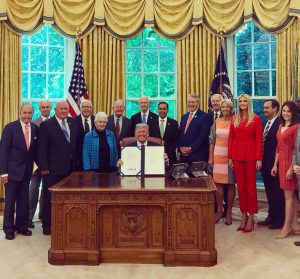
Bipartisan legislation sponsored by U.S. Rep. Glenn ‘GT’ Thompson (R-PA) that includes language from a proposal offered by U.S. Sens. Rob Portman (R-OH) and Todd Young (R-IN) toward improving the nation’s career and technical education (CTE) has been signed into law.
The new law reauthorizes the Carl D. Perkins Career and Technical Education Act, marking the first major overhaul to the program since 2006. Rep. Thompson called the bill’s passage “a win for the American worker.”
“Proud to be at the White House in the Oval Office this morning with the @POTUS for his signing of my #CTE Legislation H.R. 2353 – Strengthening Career and Technical Education for the 21st Century Act #CTE #LearnToEarn #RestoringRungsOnLadderOfOpportunity,” Rep. Thompson tweeted on July 31. The congressman, co-chair of the House CTE Caucus, introduced the House bill on May 4, 2017 with U.S. Rep. Raja Krishnamoorthi (D-IL).
Language from the bipartisan Educating Tomorrow’s Workforce Act, S. 628, introduced last March by Sens. Portman, Young, and Tim Kaine (D-VA), co-chairs of the Senate CTE Caucus, made it into H.R. 2353, which the Senate amended and unanimously passed on July 23. Noting the importance of workforce development in her home state of West Virginia, the measure garnered strong support from U.S. Sen. Shelley Moore Capito (R-WV).
After the House agreed to the Senate amendments, the legislation was presented to President Donald Trump, who signed the bill into law on July 31.
“Given the dramatic evolution of our nation’s workforce, it is imperative that we create clear pathways to education and training for students interested in pursuing careers in high-demand industries and technical fields,” Rep. Thompson said.
The congressman also noted that H.R. 2353 is “a well-engineered, bipartisan reauthorization aimed at permanently closing our nation’s skills gap. This bill will work to restore rungs on the ladder of opportunity for every American regardless of age or background.”
Senate language included in the bill will allow states and localities to use Perkins grant funding to establish CTE-focused academies, according to a summary provided by Sen. Portman’s office. Schools will be encouraged to use key components of high-quality CTE programs under the new law, which also promotes partnerships between local businesses, regional industries and other community stakeholders to establish work-based learning opportunities for students, according to the summary.
“This law is great news for Ohio, for employers who need skilled workers, and for students to ensure they have access to the highest-quality CTE programs,” Sen. Portman said, adding that the improved quality of CTE programs under the new law will provide students with a better education “using the equipment and the standards of today’s industry.”
Additionally, the senator said, the new law includes CTE program accountability information “for our most vulnerable students” that will guarantee “quality information and access to programs that meet the needs of students and parents.”
“I believe this measure will make a real difference for Ohio and I want to thank the president for signing it into law,” said Sen. Portman.
Sen. Young said reauthorization was long overdue for the CTE law, which also includes key provisions that he said benefit his home state of Indiana.
“This bill also included several provisions I helped introduce to support training for academic counselors and encourage innovative professional development training,” said Sen. Young. “Hoosiers will benefit from better alignment between CTE programs and real opportunities in the workforce.”
Sen. Capito also commended the president signing the bill into law on Tuesday.
“As our economy continues to grow and our workforce needs change, it’s absolutely critical that we make sure our students and workers have the knowledge and the skills they need to get good-paying jobs and pursue successful careers in a wide range of industries,” Sen. Capito said.
CTE prepares students to succeed in today’s workforce, the senator added, and allows them to take advantage of new opportunities in high-demand fields that will continue growing the nation’s economy.
She added that such workforce development is particularly vital in states like West Virginia that are working to increase job training programs to develop high-skilled workers.
“That’s why I have continued to champion measures to strengthen and encourage career and technical education — along with workforce development tools like apprenticeships, digital skills training and other vocational education,” Capito said.



